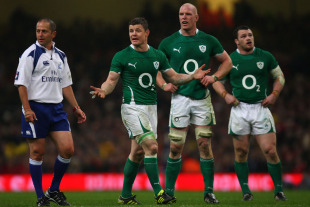|
Wales 19-13 Ireland, Six Nations, Millennium Stadium, March 12
Earls "sickened" by defeat
ESPNscrum Staff
March 12, 2011

Ireland remonstrate with referee Jonathan Kaplin following Mike Phillips' controversial try
© Getty Images
Enlarge
Keith Earls has added his voice to the chorus of discontent by describing Ireland's 19-13 Six Nations defeat by Wales as "sickening". Touch judge Peter Allan was the target of Irish fury after the Scottish official confirmed to referee Jonathan Kaplan that Mike Phillips's decisive 50th-minute try should stand. On the contrary, the disputed score breached three laws, starting with Matthew Rees failing to use the same ball that was kicked into touch for the quick line-out. Furthermore the ball picked up by Rees had been handled by a ball boy, before the series of violations was completed by the Wales hooker clearly stepping into play when throwing to Phillips. Ireland protested furiously to Kaplan, who acted on the information supplied by Allan, and the sense of injustice lingered long after the final whistle. "The try was controversial. It's bad to lose, but when you lose like that, it's sickening. It's heart-breaking," said Earls, the Lions winger who impressed in Cardiff on Saturday. "The rules state you can't take a quick line-out with another ball. "There were six points in the game and with the conversion, the try meant seven points, so it was a big factor in the result. We talked about it at the time, asking what happened. When we found out, it was sickening." No retrospective action can be taken by the IRB, but the incident may prompt a rethink in the way the TMO is used. Phillips' intervention, and Allan's lack of it, ensured the try dominated discussion of a low-quality encounter Ireland could have snatched at the death. In the final play of the game, a one-man overlap on the left was ignored by substitute Paddy Wallace, who stepped inside instead of feeding Earls. While Earls publicly supported his team-mate's decision, his exasperation was palpable. "It was very frustrating that the ball didn't come to me. It was Paddy Wallace who took the step inside," he said. "Paddy is an experienced man. He made his decision and I have to back him up. But I think that if the ball had come to me I'd have snuck in at the corner. "Paddy didn't think so and went for it, all you can do his back him up." The finger of blame also hovered over Kidney, whose decision to replace Ronan O'Gara with Jonathan Sexton in the 50th minute was highly questionable. O'Gara, who surpassed the 1,000 Test points milestone in the game, was performing reasonably and to introduce a less experienced player in such a key position when the match was so finely balanced was a major call. Surely as surprised as anyone by his unexpected introduction, Sexton's first act was to slice a kick straight into touch for the line-out that led to Phillips' try. The Leinster half-back then missed the simplest of penalties, giving the substitution the appearance of a hospital pass from Kidney. Who Kidney chooses to fill the number 10 jersey for their tournament finale against England next Saturday is anyone's guess, but the match has now taken on significance beyond the usual rivalry. Defeat at the Aviva Stadium will see Ireland equal their worst Six Nations performance alongside 2008, the aftermath of which saw Eddie O'Sullivan removed as coach. With only five games left until the World Cup to repair the damage done by a demoralising championship, the England game is of paramount importance. "People who say we have no chance against England have to think again," said Ireland captain Brian O'Driscoll. "These people have obviously never seen an Ireland-England game and don't know what it means to the Irish public and the Irish team. There's plenty of rugby left in this side." © ESPN Sports Media Ltd.
|
Live Sports
Communication error please reload the page.
-
Football
-
Cricket
-
Rugby
-
- Days
- Hrs
- Mins
- Secs
F1 - Abu Dhabi GP
Abu Dhabi Grand Prix December 11-131. Max Verstappen ()
2. Valtteri Bottas (Mercedes)
3. Lewis Hamilton (Mercedes)
4. Alexander Albon ()
5. Lando Norris ()
6. Carlos Sainz Jr ()
-
ESPNOtherLive >>
Snooker - China Open
Tennis - Miami Open

